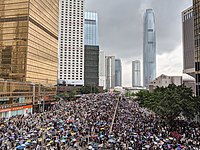
Photo from wikipedia
Policy scholars need to better describe the diversity of actors and interests that forge collective political action through nonformal social networks. The authors find extant theories of collective action to… Click to show full abstract
Policy scholars need to better describe the diversity of actors and interests that forge collective political action through nonformal social networks. The authors find extant theories of collective action to only partially explain such heterogeneity, which is exemplified by the urban protest movements in Hong Kong. A new concept, that of the narrative-network, appears better able to describe movements chiefly characterized by heterogeneity. Instead of simple commonalities among members, a relevant property is the plurivocity of narratives told by members of the coalition. Analyzing ethnographic interviews of members of the movement, the authors illustrate the utility of narrative-network analysis in explaining the complex and multiple motivations behind participation. Narrativity and the shared act of narration, within an inclusive and democratic community, are part of what sustains the movement. The research further develops the theory of the narrative-network, which helps explain the rise of street protest in Hong Kong as an emergent, alternative form of civic engagement.
Journal Title: Public Policy and Administration
Year Published: 2018
Link to full text (if available)
Share on Social Media: Sign Up to like & get
recommendations!